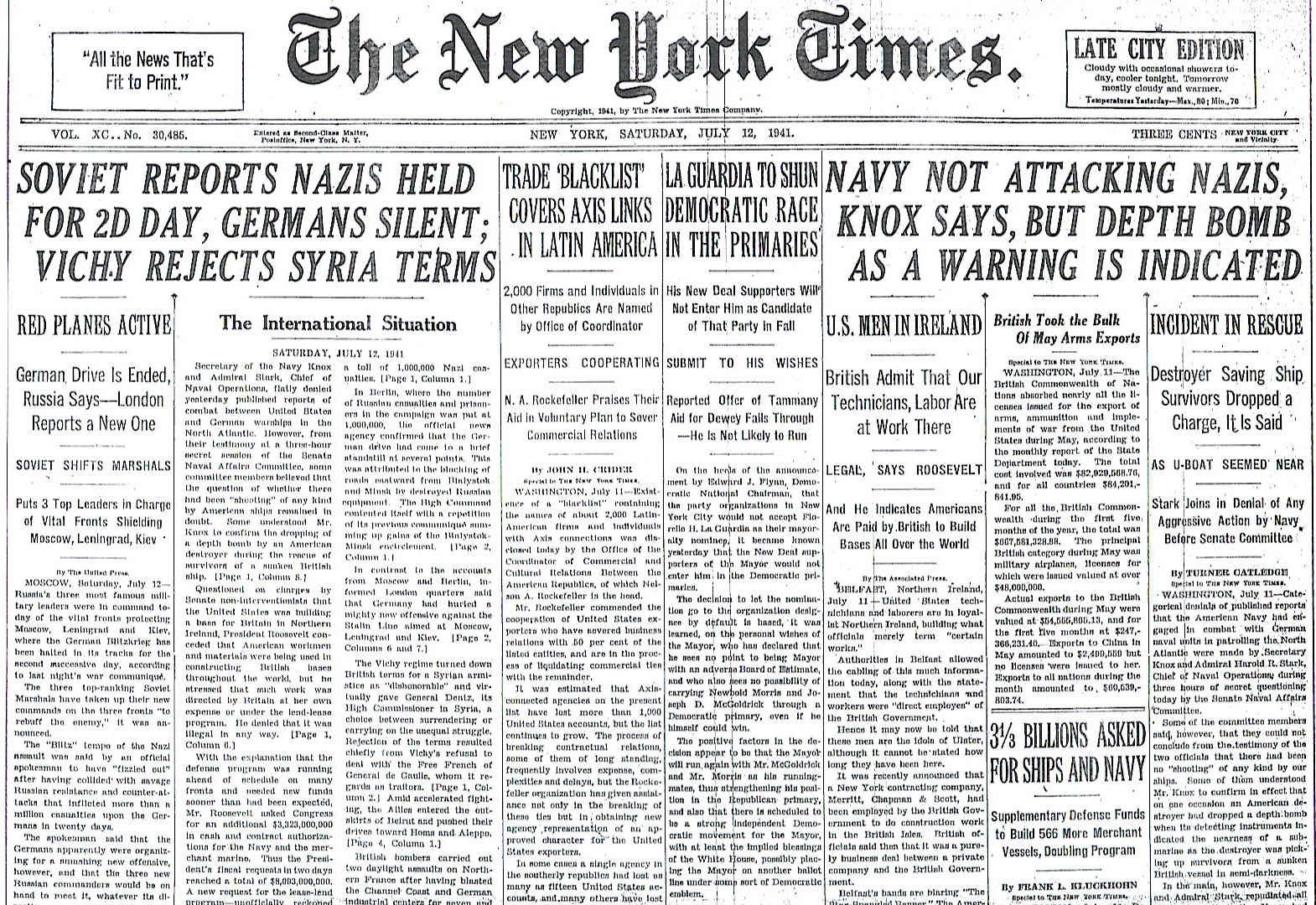
Posted on 07/12/2011 5:06:19 AM PDT by Homer_J_Simpson

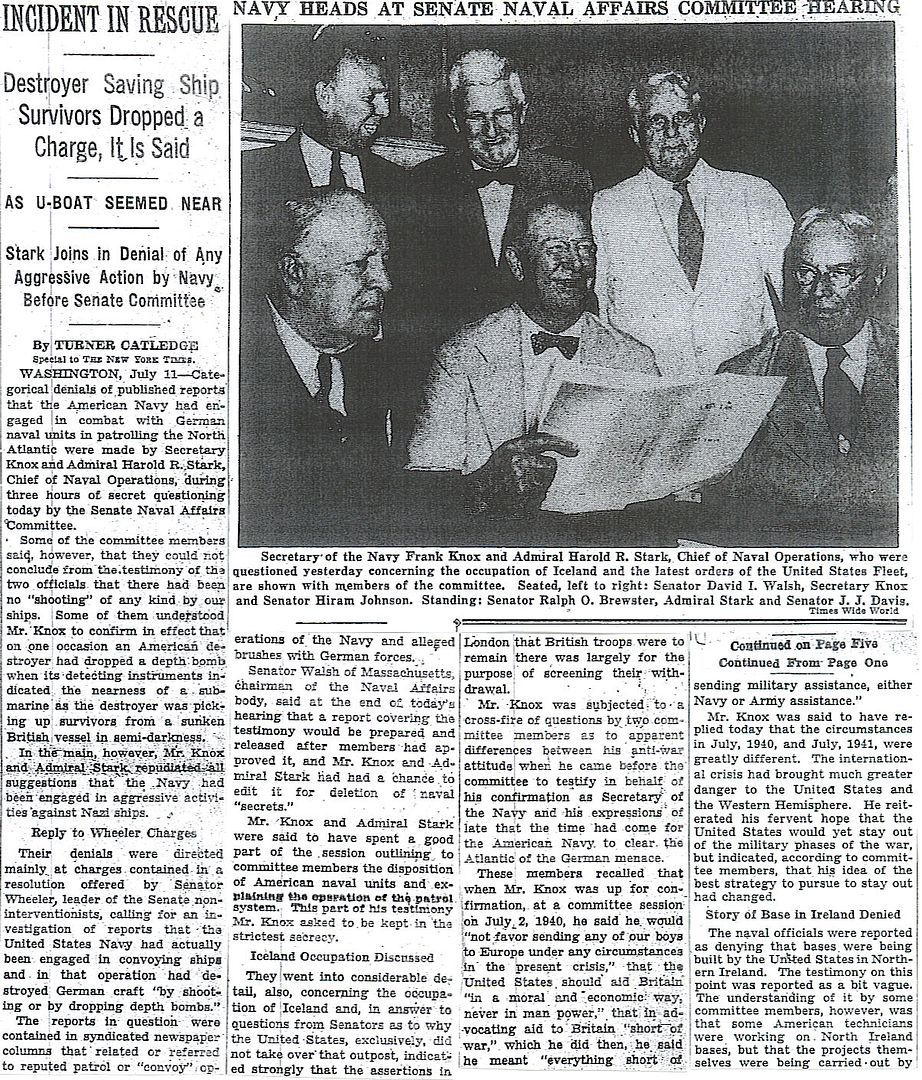
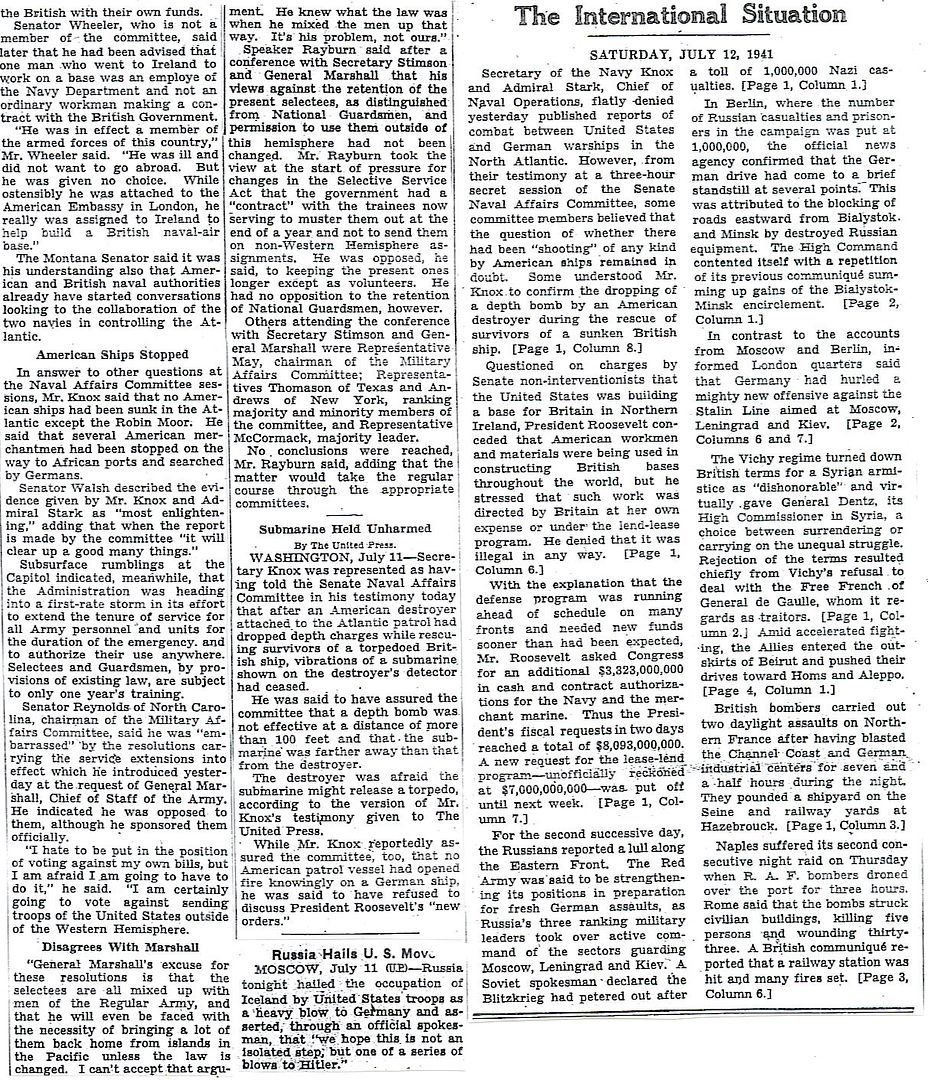
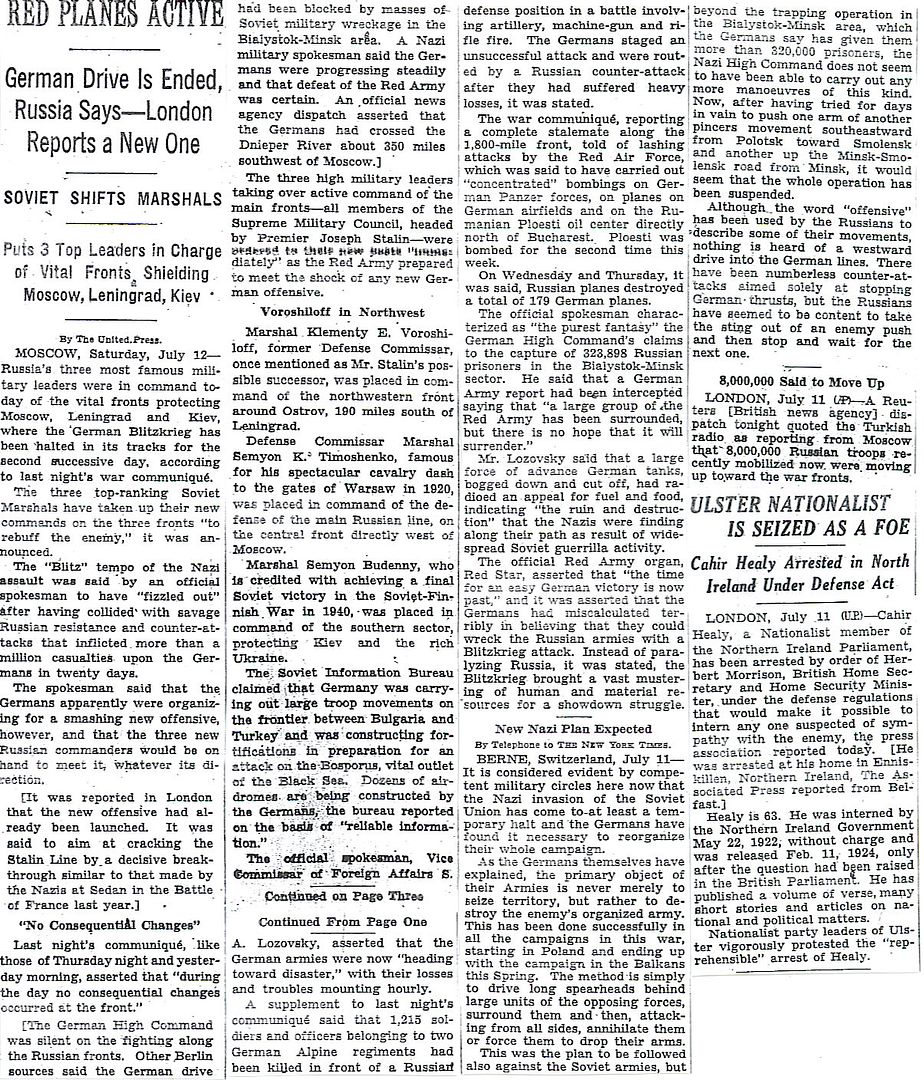
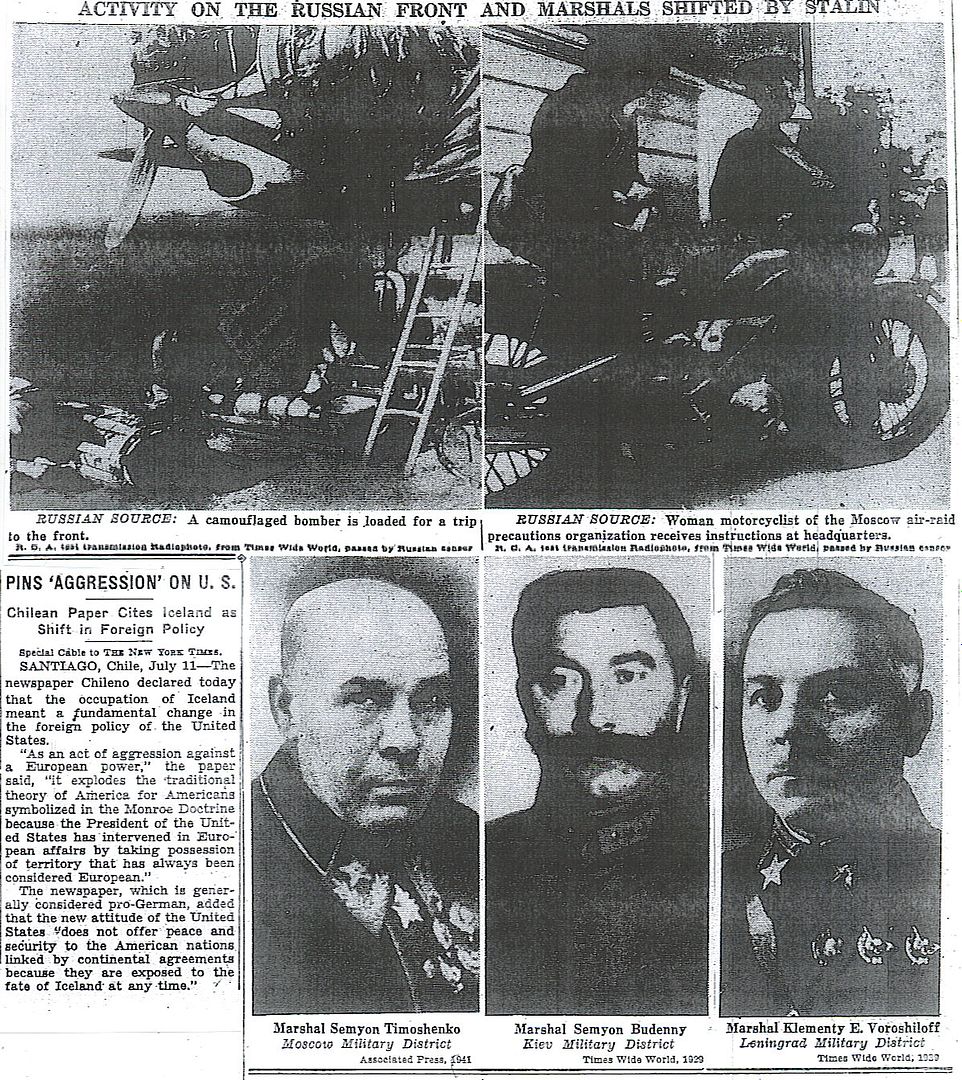
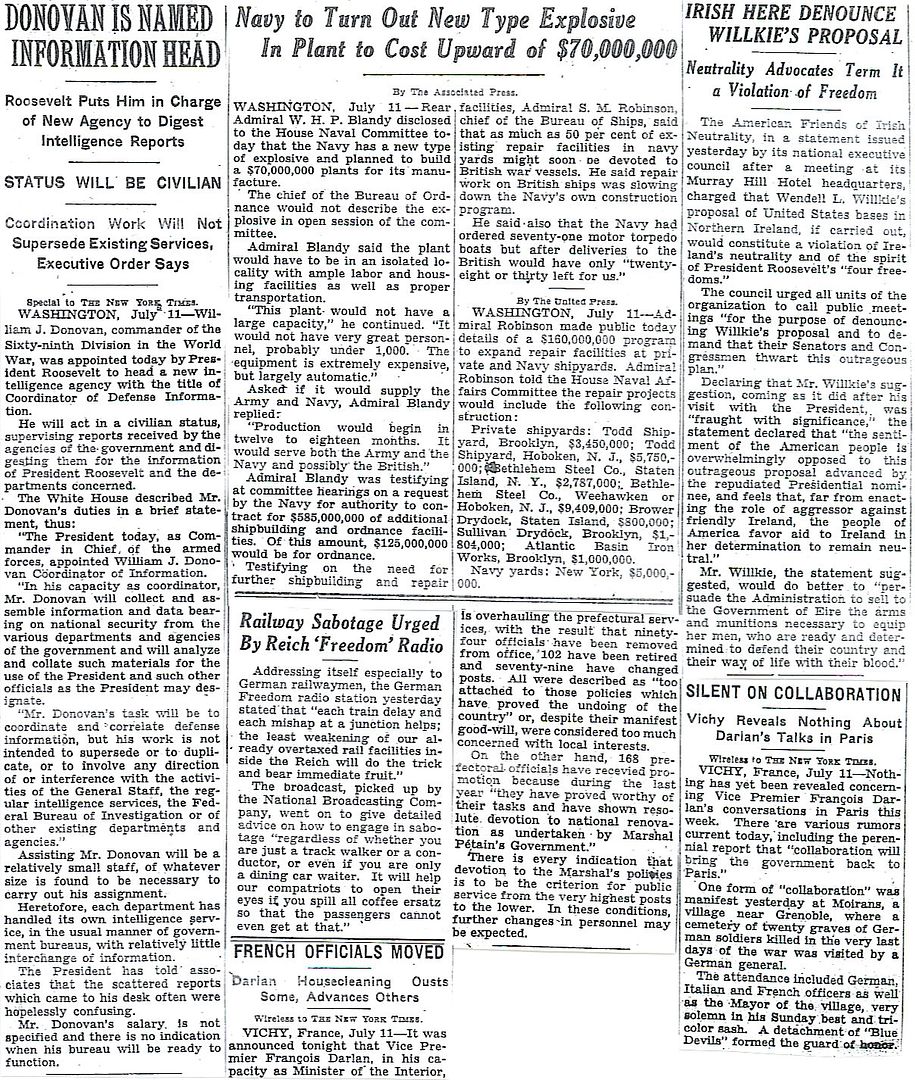
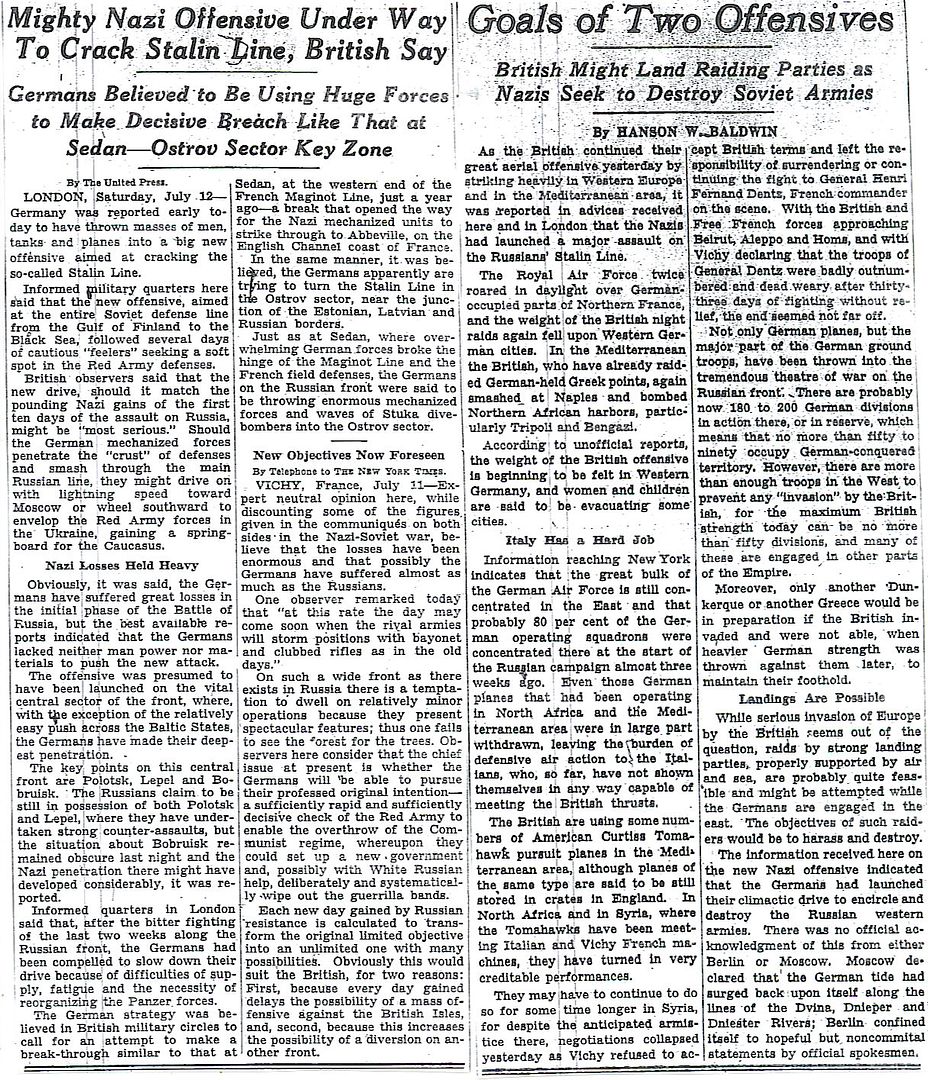
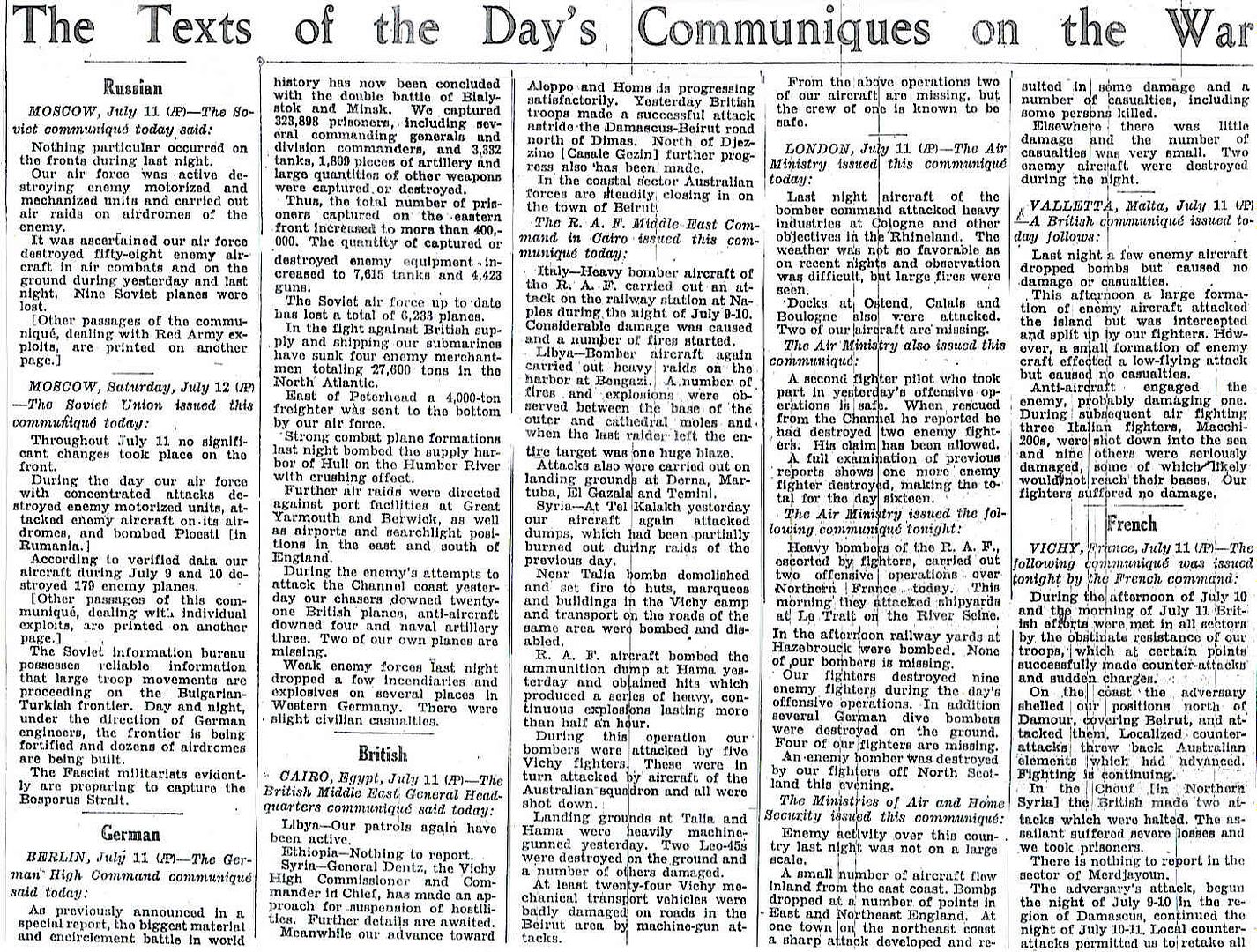
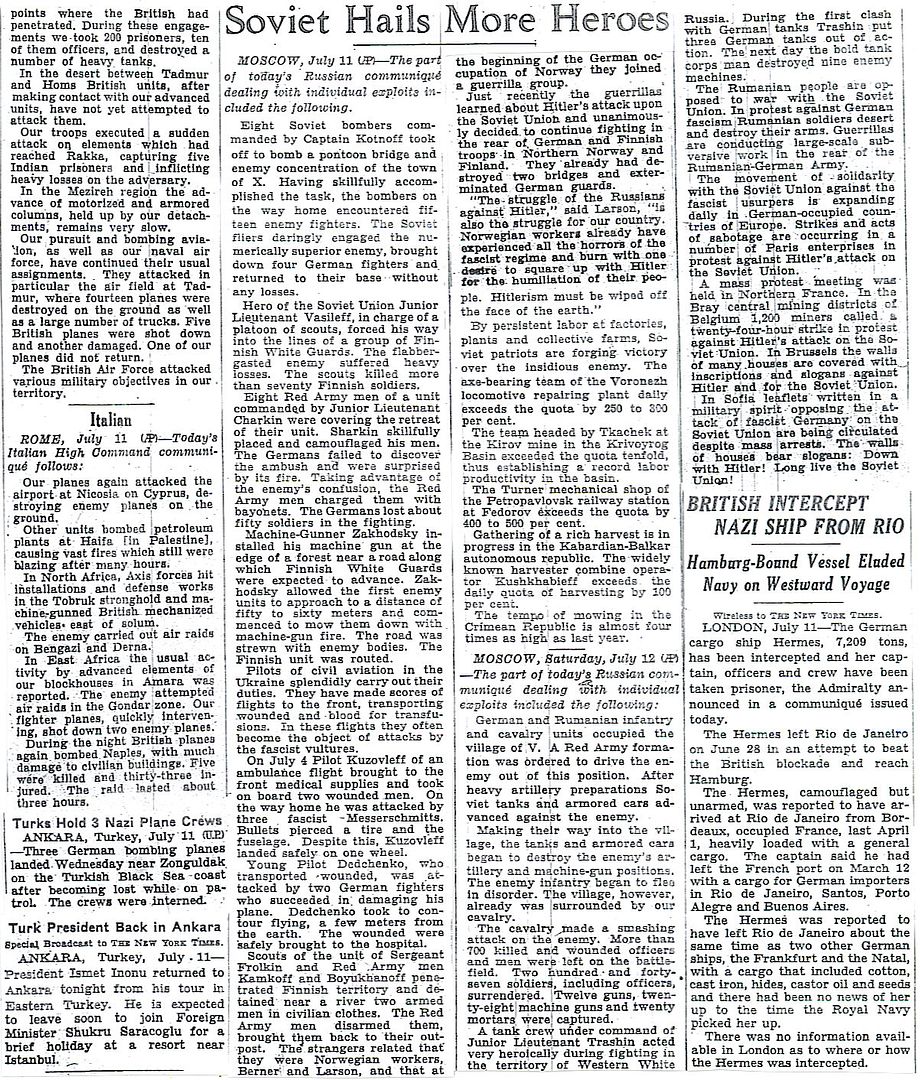
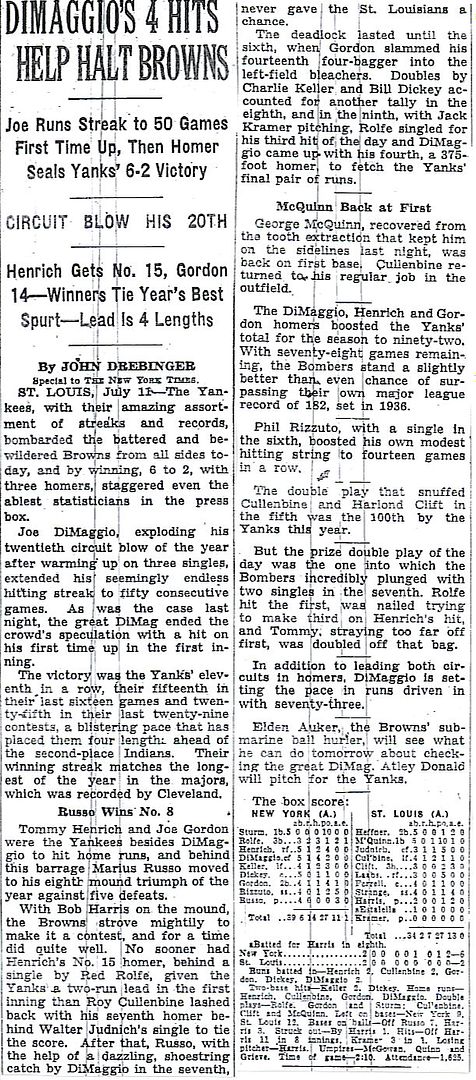
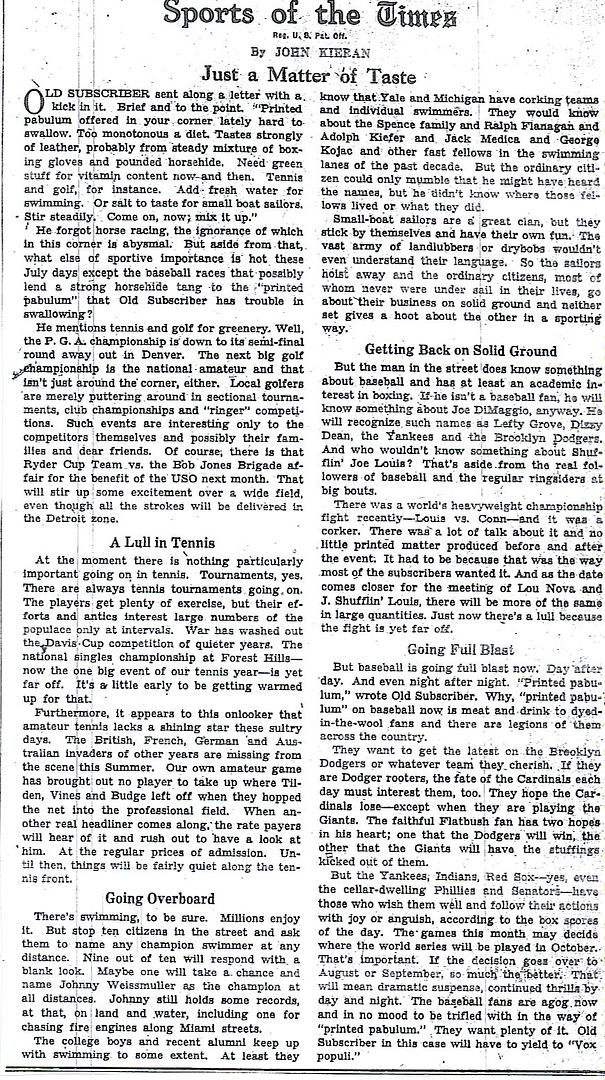
#1 - “Daddy” - Sammy Kaye, with the Kaye Choir
#2 - “Maria Elena” - Jimmy Dorsey, with Bob Eberly
#3 - “The Hut-Sut Song” – Horace Heidt, with Donna & her Don Juans
#4 – “The Hut-Sut Song” – Freddy Martin, With Eddie Stone
#5 – “Green Eyes” - Jimmy Dorsey, with Bob Eberly and Helen O’Connell
#6 - “Yours” – Jimmy Dorsey, with Bob Eberly
#7 - “The Things I love” – Jimmy Dorsey, with Bob Eberly
#8 - “Intermezzo” – Freddy Martin, with Clyde Rogers
#9 - “I’ll Be With You in Apple Blossom Time” – The Andrews Sisters
#10 - “Yes Indeed!” - Tommy Dorsey, with Jo Stafford and Sy Oliver
Incident in Rescue – 2-3
The International Situation – 3
Red Planes Active – 4
Ulster Nationalist is Seized as a Foe – 4
Activity on the Russian Front and Marshals Shifted by Stalin (photos) – 5
Donovan is Named Information Head – 6
Navy to Turn Out New Type Explosive in Plant to Cost Upward of $70,000,000 – 6
Railway Sabotage Urged by Reich ‘Freedom’ Radio – 6
Irish Here Denounce Willkie’s Proposal – 6
Mighty Nazi Offensive Under Way to Crack Stalin Line, British Say – 7
Goals of Two Offensives – 7
The Texts of the Day’s Communiques on the War – 8-9
Soviet Hails More Heroes – 9 British Intercept Nazi Ship from Rio – 9
DiMaggio’s 4 Hits Help Halt Browns – 10
Just a Matter of Taste (Sports of the Times) - 11
http://www.onwar.com/chrono/1941/jul41/f12jul41.htm
Soviets agree to united front with Britain
Saturday, July 12, 1941 www.onwar.com
In Moscow... Britain and the Soviet Union sign an agreement in Moscow providing for mutual assistance and forbidding the making of a separate peace.
On the Eastern Front... Moscow is bombed for the first time.
In North Africa... General Bastico replaces General Gariboldi as Commander in Chief of the Italian, and nominally the German, forces in North Africa.
http://homepage.ntlworld.com/andrew.etherington/month/thismonth/12.htm
July 12th, 1941
UNITED KINGDOM: British-Soviet mutual-assistance agreement signed at Moscow.
Minesweepers HMS Taitam and Waglan laid down. (Dave Shirlaw)
GERMANY: U-415 laid down.
U-160 launched. (Dave Shirlaw)
U.S.S.R.: Moscow is raided by the Luftwaffe for the first time.
Moscow:
Britain and Russia are allies again after nearly 25 hostile years. Sir Stafford Cripps, the British ambassador to Moscow, Vyacheslav and Molotov, today signed a pact which promised that both countries would “render each other assistance and support of all kinds in the present war against Hitlerite Germany.”
Stalin looked on, smiling as the two men signed the documents and the official blue ribbons and red wax seals were applied at a ceremony in the Kremlin. Then chocolates and glasses of Georgian champagne were handed round and Stalin, raising his glass, toasted Anglo-Russian co-operation for victory.
The pact, proposed by Churchill, goes further than an agreement to wage war against Hitler; it also commits both countries to an undertaking that “during this war they will neither negotiate nor conclude an armistice or treaty of peace except by mutual agreement.”
Churchill has a long memory. It was Lenin’s decision to make peace with Germany in 1918 that enabled the german to mount their last great and nearly successful offensive on the western front.
Lwow: The Nazis have posted photographs of Ukrainian nationalist prisoners slaughtered by the retreating Russians and captioned “Jewish killings.” They are exploiting a local tradition of nationalism and anti-Semitism to recruit a local militia. Just two days after the Germans arrived, local people were massacring Jews in ‘ Aktion Petlura’ a symbolic revenge for the killing of a Ukrainian by a Jews in Paris 15 years ago.
In Kovno, Lithuanian police have murdered over 3,000 Jews under German supervision, in Jassy Romanian troops killed over 200 Jews and crammed 5,000 into sealed cattle trucks. In Bialystock, the Nazi soldiers spent the first day of the occupation herding the city’s Jews into their own blazing synagogue where they died..
PALESTINE: Acre: The first armistice between British and French forces since the Battle of Waterloo was initialled today in the light of a motor cycle headlight. The armistice, ending the fighting in Syria and Lebanon between the Vichy French and the Allies, come as Allied forces tighten their grip on Beirut. For Vichy’s commander, General Dentz, it is virtually a surrender.
NORTH AFRICA: General Bastico replaces General Gariboldi as C-in-C of Axis forces in North Africa.
U.S.A.: New York Yankee center fielder Joe DiMaggio goes 2-for-5 in the third and final baseball game of the series against the St. Louis Browns at Sportmans’ Park in St. Louis, Missouri. DiMaggio’s hitting streak now stands at 51 consecutive games. (Jack McKillop)
The Germans attacked with large armoured formations, often with infantrymen riding on the tanks. Our infantry were not prepared for that. At the shout "Enemy tanks!" our companies, battalions, and even entire regiments scuttled to and fro, seeking cover behind anti-tank-gun or artillery positions, causing havoc to the whole combat order, and bunching up near anti-tank-gun positions. They lost their ability to manoeuvre, their combat readiness was diminished, and all operational control, contact, and co-operation were rendered impossible.
Yeremenko understood clearly what made the German armor superior to his own. And he drew the necessary conclusions.
He issued strict orders that the German tanks must be engaged. His recipe was concentrated artillery-fire, attack by aircraft with bombs and cannon, and, above all, engagement at close range with hand-grenades and with a new close-combat weapon which has to this day kept its German Army nickname —the Molotov Cocktail. This weapon, still a great favorite in domestic revolutions, has an interesting history.
By chance Yeremenko learned that in Gomel there was a store of a highly inflammable liquid called KS—a petrol-and phosphorus mixture with which the Red Army had experimented before the war, probably with a view to setting enemy stores and important installations on fire quickly.
Yeremenko, ingenious as ever, immediately ordered 10,000 bottles of the liquid to be delivered to his sector of the front, and issued them to combat units for use against enemy tanks. The Molotov Cocktail was no wonder weapon, but a piece of improvisation, a desperate makeshift. But quite often it was highly effective.
The liquid burst into flames the moment it came into contact with air. A second bottle, filled with petrol, added to the effect. When only petrol was available an improvised fuse tied to the bottle and lit before throwing did the trick. Provided the bottles burst high up on a tank or on its side-wall, the burning mixture would run into the combat quarters or into the engine, setting the oil and fuel on fire immediately. These large boxes of steel and tin burned surprisingly readily — probably because the metal was usually covered with a film of oil, grease, and petrol.
Needless to say, however, tank armies could not be stopped with petrol bottles, especially once the German tanks—whose strength had always consisted in their close co-operation with the infantry—paid increased attention to enemy troops trying to engage them at close range. If the Russians wanted to halt the Germans, to prevent them from driving via Smolensk to Moscow, they would have to bring up large numbers of men and a lot of artillery.
The Soviet High Command therefore switched parts of its Nineteenth Army from Southern Russia to the Vitebsk area. The Russian regiments leaped out of their goods trucks and went straight into battle against Hoth's 7th and 12th Panzer Divisions. Yeremenko realized that he was slowly sacrificing a considerable force of six infantry divisions and a motorized corps. But what else could he do? He hoped that in this way he would at least delay the German spearheads. Time was what he needed.
But Yeremenko's hopes were in vain. The reconnaissance detachment of 7th Panzer Division captured a Soviet officer from an anti-aircraft unit. In his possession were found orders, dated 8th July, which revealed Yeremenko's plan to detrain divisions of the Nineteenth Army north of Vitebsk and employ them on the narrow strip of land between the rivers. Colonel-General Hoth took immediate counter-measures. He ordered Lieutenant-General Stumpff's 20th Panzer Division, which on 7th July had crossed over to the northern bank of the Western Dvina at Ulla, to advance on 9th July along that bank of the river in the direction of Vitebsk. On the neck of land south of the Western Dvina the 7th and 12th Panzer Divisions were meanwhile tying down Yeremenko's forces. Stumpff's tanks, together with the swiftly brought-up 20th Motorized Infantry Division, under Major-General Zorn, drove straight into the Russian rear and caused chaos to the enemy's detraining operations.
It was the early morning of 10th July—the nineteenth day of the campaign. It was to be a day of dramatic decisions. The German Blitzkrieg was still in full swing. Pskov, south of Lake Peipus, had fallen. General Reinhardt’s XLI Panzer Corps had pierced the Stalin Line with its 1st Panzer Division and parts of 6th Panzer Division, and on 4th July, after some fierce tank fighting, taken Ostrov. Continuing its swift advance, the northern Panzer corps of Colonel-General Hoepner’s Fourth Panzer Group, with 36th Motorized Infantry Division and parts of 1st Panzer Division, four days later reached the vital turning-point on the way to Leningrad. Hoepner ordered the troops to wheel north-east towards the city. Perhaps Leningrad would fall even before Smolensk. And if it fell Russia’s armed might in the Baltic would collapse. Moscow’s northern flank would lie exposed. Then the race could start as to who would first drive into the Kremlin—Hoepner, Hoth, or Guderian?
Things were looking hopeful. Maybe Hoepner would repeat his 1939 triumph of Warsaw, when the 1st and 4th Panzer Divisions of his XVI Motorized Corps stood west and south of the Polish capital within eight days of the start of operations.
Two hundred miles south of Pskov was Vitebsk, the ancient, neoclassical city with its large Jewish population and its huge and vital railway junction on the upper Western Dvina. It was the gateway to Smolensk.
And Vitebsk fell.
The 20th Panzer Division took it by storm on 10th July. Fanatical Komsomol members had set fire to the town. It was blazing. But Hoth’s Panzer divisions needed no quarters for the night. They simply drove past the burning town, forward, farther to the east, into the rear of Smolensk.
German cavalry unit and newly arrived infantry reserves scouting along the Pinsk marshes. July 41
Soviet soldier suspected of planting mines. North of Rovno
Soviets surrender to passing German unit. Ukraine July 41
Soviet T-35 abandoned in Bobruisk-July 14,41
The Stalin Line-Western Ukraine July 41
Stuka landing on a dirt strip in the western Ukraine
Soviet armor destroyed in northern Minsk July 41
Aftermath of battle with two Soviet snipers in Lepel, July 14
I thought this weapon was first used by the Finns during the Winter War of 1939-40.
definitely sports !
You may be right although I've seen references to its first use in Spain by the Nationalist, by the Japanese in the battle of Khalkhin Gol and as you stated, in Finland.
Disclaimer: Opinions posted on Free Republic are those of the individual posters and do not necessarily represent the opinion of Free Republic or its management. All materials posted herein are protected by copyright law and the exemption for fair use of copyrighted works.